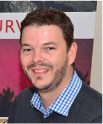Session 16. Oral Presentation for: Optimising CO2 storage resource utilisation: insights from the Otway Stage 4 field program
Max Watson A *
A *
A

Max Watson is the Senior Manager for Technology Development at CO2CRC Ltd. and is Australia’s Delegate for the Carbon Sequestration Leadership Forum, a Ministerial-level international climate change initiative. Max has over 23 years of experience in developing industry-relevant, low-emission technologies, including carbon capture, utilisation and storage (CCUS) and, more recently, hydrogen storage. Max has worked in academia, industry, and research and development management sectors, gaining insights from a variety of countries and business types. He completed his PhD at The University of Adelaide. |
Abstract
Presented on Wednesday 22 May: Session 16
The optimised utilisation of storage resources and accelerated commercial carbon dioxide (CO2) storage development is vital for carbon capture and storage to play its important role in reducing emissions at scale. CO2CRC seeks to address this challenge through an international collaboration – the Otway Stage 4 field program – that demonstrates a suite of cost-effective reservoir management techniques with the potential to improve CO2 storage capabilities, particularly in lower-quality reservoirs, maturing them for commercial readiness. Aiming to enhance injectivity, improve sweep, increase model resolution, and develop performance monitoring capabilities, Otway 4 will substantially improve CO2 storage resource usage, furthering economical viability for decreasing CO2 emissions to the atmosphere. Otway Stage 4 includes acquisition and analysis of CO2 saturation and chemical data during plume migration and trapping, combined with investigation of fine-scale geological heterogeneity’s role in CO2 flow dynamics, to refine modelling workflows and, ultimately, develop strategies for optimising commercial CO2 storage; demonstrating whether CO2 microbubbles (MBs) significantly increase storage efficiency compared to standard CO2 injection, thereby unlocking previously untenable reservoirs for CO2 storage; enhancing seismic monitoring to comprehensively assess storage performance and MB behaviour, including quantitative derivation of CO2 saturation; and demonstrating the capability of Distributed Strain Sensing to quantitatively measure geomechanical changes associated with CO2 injection. In addition to Otway 4’s forward plans, laboratory and modelling work, including core flood analysis, to understand CO2 MB and surfactant behaviour at pore scale, dynamic modelling of CO2 flow through heterogeneous reservoir, and selecting suitable injection intervals at the Otway site are discussed.
To access the Oral Presentation click the link on the right. To read the full paper click here
Keywords: CO2 storage, fibre optics, geological modelling, heterogeneous, microbubble, optimisation, otway, pore space, reservoir modelling, seismic, surfactant, utilisation.
 Max Watson is the Senior Manager for Technology Development at CO2CRC Ltd. and is Australia’s Delegate for the Carbon Sequestration Leadership Forum, a Ministerial-level international climate change initiative. Max has over 23 years of experience in developing industry-relevant, low-emission technologies, including carbon capture, utilisation and storage (CCUS) and, more recently, hydrogen storage. Max has worked in academia, industry, and research and development management sectors, gaining insights from a variety of countries and business types. He completed his PhD at The University of Adelaide. |


